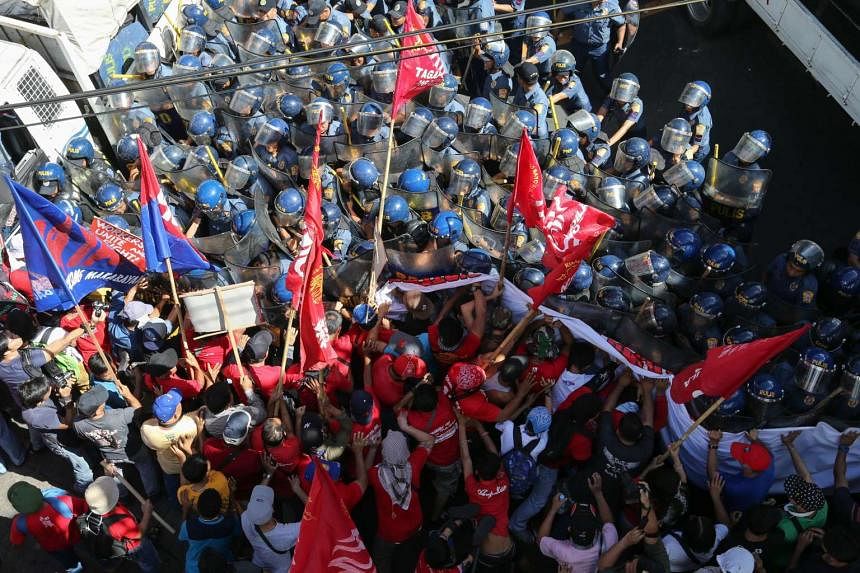MANILA • They say time heals all wounds. I think it's true, but only because time also steals memories, both good and bad.
Thirty years ago, on Feb 25, at around 10pm, Ferdinand Marcos, the dictator who presided over a brutal regime that bled the Philippines dry for 21 years, boarded an American helicopter and fled with his family and closest collaborators to Hawaii, where he would die three years later, defeated and broken.
A spontaneous, four-day, "People Power" uprising right in the heart of Manila finally forced Marcos to let go. It was the end of a collective nightmare.
But 30 years on, Marcos is back, not the same man, but the same name. His only son, Mr Ferdinand Marcos Jr, still boyish-looking even at 58 and a spitting image of his father in his prime, has clawed his way to the top of polls on who voters want to be the Philippines' next vice-president.
The whole family is, in fact, back.
Mrs Imelda Marcos, famed for her 10,000 pairs of shoes and legendary shopping sprees, is a two-term congresswoman. Marcos' eldest daughter Imee is a governor and had herself been a lawmaker. Her 26-year-old son, meanwhile, is running for a provincial board seat.
Even the old man is still around, his embalmed remains still encased in a glass coffin, till the government accedes to the Marcoses' demand to have him buried at a national heroes' cemetery. With the stunning upswing in their political fortunes, the Marcoses may soon have their way.
This begs the question: After 30 years, has the Philippines forgotten?
Not really.
Those who lived under Marcos' long shadow have kicked off "#neverforget" campaigns to mark the 30th anniversary of the People Power revolt. Twitter accounts and blogs were created to recreate People Power as it unfolded 30 years ago.
Meanwhile, thousands who were jailed and tortured through the days of disquiet and nights of terror that went with martial rule from 1972 to 1981 have regrouped to derail the younger Marcos' remarkable political run. They are holding rallies, publishing books, writing opinion pieces and testimonials, and airing documentaries to make sure the nation does not forget.
But this is an ageing, fading voice.
Thirty years have spawned a whole new generation who feel they have no quarrel with Marcos and are more willing to skim over the past and give his family a second chance. They were too young to feel the cruelty and brutality Marcos was capable of or the sense of astonishment and possibility that went with the 1986 uprising. But they are now old enough to begrudge the promises they believe were never kept.
While civil liberties that Marcos stifled have been restored, the Philippines, after five presidents, remains one of the poorest in the region. In 30 years since 1986, the nation went through a crippling energy crisis and another popular revolt that unseated yet another corrupt, abusive president.
Traffic has become a nightmare for millions living in the capital and while tall, gleaming buildings and exclusive enclaves are sprouting all over Manila, farmers in the boondocks are hanging themselves because they are too deep in debt.
On social media, many are posting images of Manila from when Marcos was still around - roads free of traffic, uncluttered skylines - and comparing them to how it is now. For the post-People Power generation, none of the troubles that bedevil the nation now is Marcos' fault.
Mr Marcos Jr is riding high on that sentiment, as he marches ever closer to his father's old post. He has been adept enough to steer the conversation away from the past and instead draw the public's attention to his own record as a public official.
As governor, he transformed his father's home province of Ilocos Norte, 480km north of Manila, from a sleepy, tobacco-dependent region into a bustling commercial hub. He also steered a huge wind energy project.
Even shrewder, he has conceded that his father was no saint.
"I am not my past," he has said.
But he has been louder in trumpeting what he believes was the "golden age" that was his father's rule: thousands of kilometres of roads, rice self-sufficiency, high literacy rate.
It may be too late now to roll back the Marcos juggernaut. As one astute political writer has observed: People Power knocked down the Marcos tree in 1986.
But its roots - the cronies who have reinvented themselves, the unbroken line of political dynasties, the system of corruption that has thwarted justice - remained firm in the ground. All the Marcoses had to do was nurture these roots and wait for the tree to grow back.
Decades of bitter disappointment and unkept promises have given that tree fertile ground to grow, and the Marcoses are now ready to harvest its fruits.
I was 17 in 1986. Now, I am 46. I still remember, but I am entitled to just one vote.



